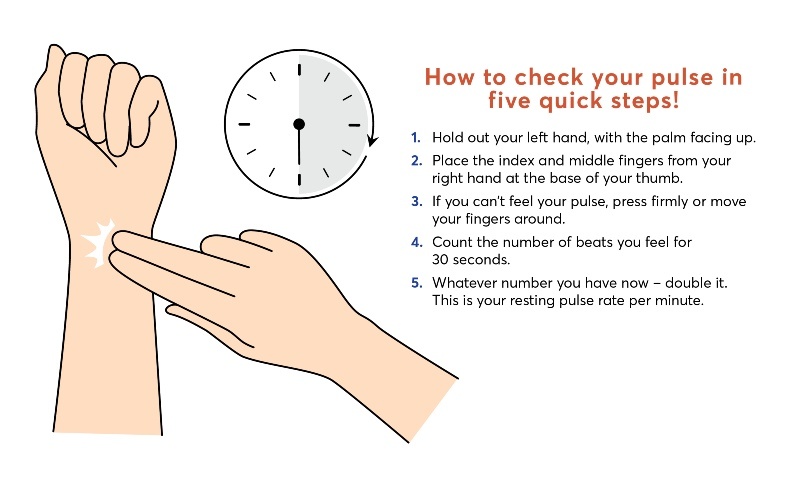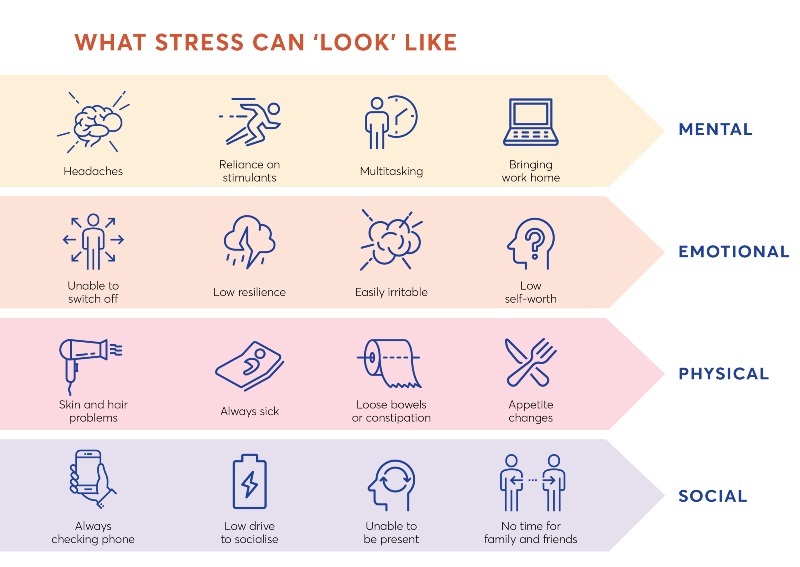- Home
- Mind & body
- The brain-gut connection: is stress impacting your gut?
At CBHS we help you manage your health challenges. We believe in offering you the services, support and tools you need to live your best life.
Our Better Living Programs are available to support eligible members towards a healthier lifestyle. Each Better Living Program is subject to its own eligibility criteria.
Contact us for more information and to confirm your eligibility for a program.
The brain-gut connection: is stress impacting your gut?

Have you ever needed to quickly use the bathroom when you’ve felt nervous? Did you lose your appetite before a big date, or an important presentation? These gut-wrenching experiences are called that for a reason because they’ve literally had an impact on your gut.
The gut is more sensitive than you think so it reacts to emotions like anger, anxiety, sadness and even joy by making you feel queasy or have an urgent need to use the toilet before things get messy! It’s not a coincidence when a stressful event in your life coincides with an emergency trip to the bathroom.
The ‘gut feelings’ you may feel when you’re stressed are not ‘all in your head’ – in fact, they’re connected to your head! These physical triggers are your body’s way of letting you know it’s not in a relaxed state.
Here are some practical tips and techniques you can incorporate into your life to manage your stress and gut function.
Check your pulse
You may not think this is important, but stress isn’t always obvious. Something as simple as a quick pulse can be a strong indicator of your mental state.

Resting heart rates can vary from person to person based on factors like age, medications, smoking, caffeine intake and more. A normal resting heart rate can range between 60-100 beats per minute (bpm) unless you’re an athlete in which case your bpm will usually be under the 60bpm mark!
If your resting heart rate is consistently over 80bpm without any existing medical conditions, this may mean you’re under stress and you need to make time to see your GP. Prolonged stress can make your resting heart rate creep up over time which isn't healthy for your heart.
“When your body is under stress, you’re more likely to eat food that’s high in fat and sugar which can have a negative impact on your gut.”
How can stress show up in your life?
We’ve already explored the idea that stress can be silent and not immediately obvious. Here’s a quick look at what stress can ‘look and feel’ like in your life.

If you recognise some of these ‘symptoms’ of chronic stress in yourself, it’s time to take a closer look at your diet and lifestyle. Unchecked stress in your life can ultimately affect your immune system in the long term.
Why do emotions and stress impact the gut?
Those literal ‘gut feelings’ we get when we’re feeling nervous or anxious are because of the ongoing communication between our brain and gastrointestinal tract or what’s also called the “gut-brain axis.”
A complex communication network, the gut-brain axis includes our nervous system, gut-hormone signalling pathways, our immune system and products that are made by our microbes.
What is the gut microbiome?
Largely formed during the first three years of life, the gut microbiome is home to trillions of micro-organisms and genetic material that live in the intestinal tract. It’s mainly made up of bacteria that plays a vital role in digesting the food we eat as well as the nutrients we absorb.
They work hard for our gut health day in, day out without us even being aware. And when we’re under stress, the composition of the ‘gut bugs’ that thrive in this little community can change. In other words, stress can change the ‘weather’ in our gut by reducing the diversity of our beneficial gut flora. And because the gut is our immune system’s gateway, we can put it at risk if we’re in a constant state of stress.
“Chronic stress reduces blood flow to our stomach and intestines which can cause bloating, cramping, slow digestion and constipation.”
The vagus nerve – a key player in your gut-brain connection
Sometimes referred to as your secret weapon for fighting stress, the vagus nerve system can help trigger a relaxation response in your body when it’s stimulated through deep, intentional breathing. It’s also the fastest and most important route from your gut to the brain and represents the main component of the ‘rest and digest’ nervous system.
The vagus nerve controls many crucial functions in your body like:
- Mood
- Immune response
- Digestion
- Heart rate.
The vagus nerve has also been described as the ‘walkie talkie’ between our gut and brain because it tells your brain how you’re feeling via electric impulses.
How to stimulate your vagus nerve – for a calmer you!
One of the most effective ways you can stimulate the healthy function of your vagus nerve is by taking deep, slow belly breaths. Vagus nerve stimulation reduces our cortisol levels so we can manage stress more effectively.
Learning how to do ‘diaphragmatic triangle breathing’ can help you shift your attention away from any pain or stress you may be feeling. When you focus on your breath, you calm the nervous system by switching off your body’s ‘flight
or fight’ mode. Your mind relaxes to positively impact the state of your gut.
Diaphragmatic triangle breathing in five easy steps:
- Sit up straight with your shoulders back.
- Breathe in, drawing air into your belly for four seconds.
- Hold for seven seconds.
- Breathe out for eight seconds with pursed lips making a ‘whoosh’ sound.
- Contract your belly (or diaphragm) to push the last of the air out.
Repeat this sequence three times and pay close attention to your exhale which is what really triggers your body’s relaxation response.
This simple video will show you how to practice diaphragmatic triangle breathing to create a calm moment in your day anytime, anywhere. You may feel the effects of this powerful breathing exercise in as little as three breaths or 90 seconds. Anyone can find two minutes in their day to try this out!
“Did you know? A good, old fashioned belly laugh and a relaxing foot rub can stimulate the vagus nerve and reduce your stress levels!”

Other great ways to stimulate your vagus nerve:
- Laugh! Laughter lifts your mood and gives your immune system a boost
- Immerse your forehead, eyes and cheeks in cold water
- Enjoy a foot massage – firm or gentle touch feels good and does good!
- Sing loudly! Even out of tune singing activates the vocal chords.
Did you know your gut is called the second brain?
It may sound strange, but it’s true. Our gut is also called the "second brain" because the intestinal tract is surrounded by mesh-like nerve fibres that make up the enteric nervous system which controls your gut function and immune system. What’s more, the cells and microbes that live in your gut can help produce many of the same neurotransmitters your brain does.
For example, serotonin, also known as the ‘happy chemical’ and dopamine popularly known as the ‘pleasure chemical’ are both produced in the gut and brain. However, our gut can function independently from the brain. This means your gut doesn’t need your brain to tell it when it’s time to digest that big breakfast you had in the morning!
Read more about the chemicals that influence your mood.
How emotional and stress eating can impact your gut
We’ve all been there… it’s late at night, you’re exhausted and stressed after a long day and now you’re craving a snack. You’re unlikely to reach for something wholesome, and that’s the issue.
When we go for the snacks that are high in fat, sugar, salt – or all three – we’re giving our gut a hit of foods that can do more harm than good.

Your food choices reflect how you’re feeling
Here’s what the foods you’re craving say about your stress and how well you’re managing it.
High fat and sugary foods: takeaway and chocolate
You
might not be eating enough or you may be skipping meals, so you compensate by choosing high-energy foods.
Crunchy or textured foods: cookies
You might be comfort eating even if you’re not hungry, as a way of feeling productive. This is a little like biting your nails or fidgeting.
Salty snacks: chips
You may be dehydrated or fatigued (because of dehydration) and perhaps you’ve had too much coffee which is a diuretic.
Coffee and other energy drinks
You’re possibly not sleeping enough, or maybe you’re stressed and anxious so you turn to caffeinated drinks for a quick pick-me-up but you get the opposite results.
Of course, moderation is key. So, if you’re only indulging in these snacks and drinks every now and then, your gut health won’t be drastically impacted. However, if your only way to manage stress is through emotional eating and drinking, it’s time to take another look at your diet and lifestyle.
“A diet full of processed food can reduce the number of beneficial bacteria in your gut and affect your immune system in the long term.”
Tips on giving your body a ‘gutful’ of health!
If you find that you’re eating more processed food and caffeinated energy drinks when you’re feeling stressed or overwhelmed, you’re not alone! We’ve put together a short list of healthy non-food strategies that can help you manage stress – and support your gut health in the process.
Mindful eating
How often have you scoffed down your lunch in between meetings or demolished half a packet of Tim Tams without even realising?
Creating a stress-free zone can help you savour your food at a leisurely place without pressure. Mindful eating is based on taking the time to truly enjoy your meal without rushing. This can reduce bloating and general stomach discomfort. It can also help you become more in tune with your hunger as you start to observe how your body feels before, during and after a meal.
Meditation
This ancient practice isn’t just about winding
down after a yoga class (!), it’s also a great way to focus the mind and reduce stress levels. You can meditate a few minutes each day on your own or through guided meditations via one of the many apps available online.
Gratitude journals
It may sound like a simple thing but the physical act of writing down what you’re grateful for each day can do wonders for your emotional health. You can write as much or as little as you like, the point is to just, write. With regular practice, your focus will return to what’s great
in your life rather than what’s missing. It’s also a powerful way to slow down your thoughts after a hectic day.
Movement
You don’t need to sweat it out at the gym to reap the emotional benefits of regular movement. Gentle, mindful exercise like light stretching, yoga,
tai chi or even a brisk walk through the park can help relax both your mind and body.

“Yoga is thought to relieve bloating and cramping through a combination of poses, deep breathing and meditation.”
Keep your gut stress-free – for a happier, healthier you!
We’ve all experienced those ‘gut feelings’ when we’re anxious and stressed but you’re not imagining things. There’s ongoing communication between our brain and gastrointestinal tract. That’s why stress, pressure, sadness and even joy can have an impact on your gut health.
So, while managing our stress levels is important for our overall wellbeing – it’s particularly vital when it comes to a healthy functioning gut. By adding some effective stress-relieving strategies to your life like deep breathing, movement, a gratitude journal, meditation and even laughing more, you’re well on the way to better emotional health – and a happier gut! You’re also less likely to raid the pantry for chips or chocolate when you’re feeling overwhelmed.
Ultimately, your gut is ‘talking’ to you all the time – so listen up and start enjoying a healthier mind and body.
For more helpful articles on managing your stress levels and keeping your gut healthy, check out our sections on Stress and Gut health.
All information contained in this article is intended for general information purposes only. The information provided should not be relied upon as medical advice and does not supersede or replace a consultation with a suitably qualified healthcare professional.
Sources:
https://www.cbhs.com.au/mind-and-body/healthy-recipes
https://www.cbhs.com.au/mind-and-body/blog/curb-your-cravings-how-to-resist-those-snack-temptations
https://www.onhealth.com/content/1/normal_healthy_heart_rate_charts_health_heart
https://www.frontiersin.org/articles/10.3389/fimmu.2020.604179/full
https://www.hopkinsmedicine.org/health/wellness-and-prevention/the-brain-gut-connection
https://www.arcvic.org.au/34-resources/402-vagus-nerve-exercises
https://qbi.uq.edu.au/brain/brain-anatomy/peripheral-nervous-system/enteric-nervous-system
https://foodandmoodcentre.com.au/2016/07/what-is-the-gut-microbiome/
Health and wellbeing
programs & support
You Belong to More with CBHS Hospital cover:
- Greater choice over your health options including who treats you
- Get care at home with Hospital Substitute Treatment program
- Free health and wellbeing programs to support your health challenges
Live your healthiest, happiest life with CBHS Extras cover:
- Benefits for proactive health checks e.g. bone density tests, eye screenings
- Keep up your care with telehealth and digital options
- Save on dental and optical with CBHS Choice Network providers
